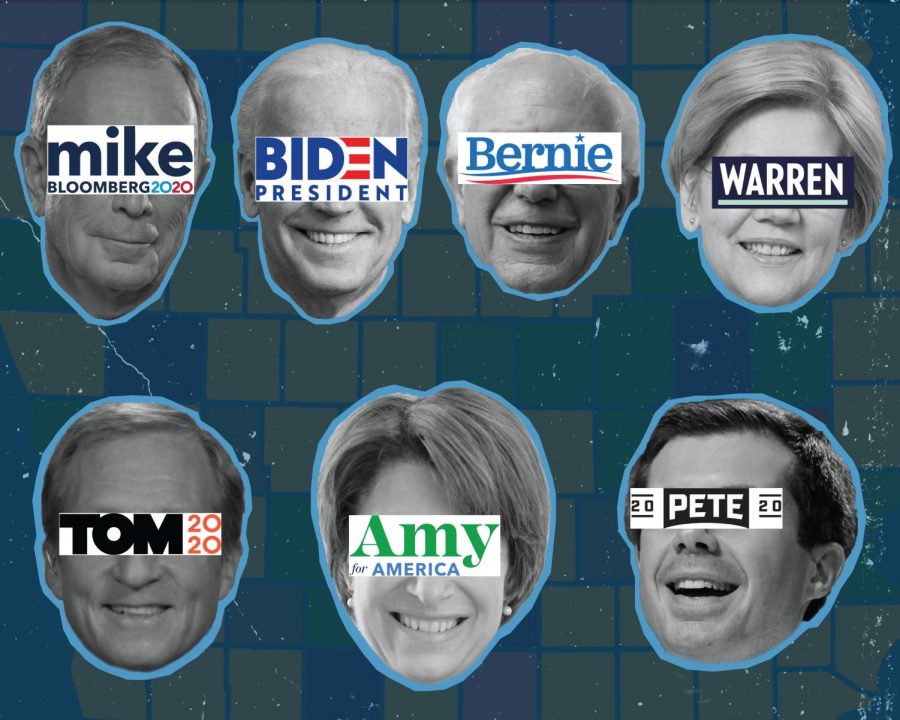As the Democratic Primaries Heat Up, Sanders Rises, Then Falters
RACE TO THE NOMINATION: A crowded field of Democratic candidates fight through early caucuses and primaries.
March 6, 2020
As the Democratic Presidential primary elections on Super Tuesday close, the field of candidates has shaken up one final time before the nominee is decided. Last week, Senator Bernie Sanders emerged as the clear frontrunner after a near-tie in Iowa, a close win in New Hampshire, and a landslide victory in Nevada. The Democratic-Socialist had been able to amass a wide coalition of supporters, including Latinx voters, who then helped him also win the huge Super Tuesday state of California.
Sanders had a polling lead going into Super Tuesday, but a series of shake-ups changed that. Former moderate frontrunner Pete Buttigieg dropped out of the race on Sunday after slipping in polls, with an expected underperformance on Super Tuesday. Senator Amy Klobuchar dropped out as well, unable to expand her support. Both endorsed former Vice President Joe Biden, leading to a huge consolidation of moderate support around him going into Super Tuesday. Following a massive South Carolina win among the key Democratic base demographic of black voters, Biden skyrocketed into the role of moderate frontrunner and then party frontrunner, winning Super Tuesday narrowly over Sanders.
Senator Elizabeth Warren and former New York City mayor Michael Bloomberg dropped out following underwhelming Super Tuesday performances, leaving Biden and Sanders the only two major Democratic candidates remaining. Biden leads with 637 delegates, but Sanders is close behind with 559. To win the final nomination, 1,991 delegates are needed.
Before Super Tuesday, Bernie Sanders appeared to be in the lead in the election. But controversy over his radical politics swept the media and national conversation. The Vermont Senator has served in Congress since 1991 and is known for fighting for far-left progressive liberalism. He is a Democratic-Socialist who favors a “social revolution” towards greater welfare and equality. His trademark policies include “Medicare for All,” a single-payer healthcare system, and the “Green New Deal,” an expansive climate plan. Sanders ran in the 2016 Democratic Presidential primary against Hillary Clinton, winning New Hampshire and nearly winning Iowa, but ultimately falling short of the nomination.
As the frontrunner, Sanders has been facing intense scrutiny from the party establishment and moderate voters. Because of his radical beliefs, tenuous party affiliation, and expensive policies, many doubt he can beat President Donald Trump and enact his plans while in the White House. He has been relentlessly attacked by the other candidates, most notably by Buttigieg, who said “Senator Sanders believes in an inflexible, ideological revolution that leaves out most Democrats, not to mention most Americans,” and Biden, who said “I ain’t a socialist, I ain’t a plutocrat, I’m a Democrat.”
The fear that a radical Democratic-Socialist would struggle in the general election in swing states seems to worry Democratic voters. Polling unreliably answers this question, with some placing him in a narrow lead over President Trump, and some showing him lagging behind. IHS junior Kees Hoek explained, “It’s just his ideas are too radical. I don’t see him being able to get elected, just because there’s no way that any Republicans would ever consider him.” Senior Claire Mura, who calls herself a socially-liberal Republican, said, “I think a moderate democrat should be elected because they have more national appeal for people like me who are very distraught about their own party.” Senior Rhea Kulkarni agreed, adding, “By taking a more moderate approach to things, you open more discussions with voters.” All three of them supported Pete Buttigieg, before he dropped out.
Additional concerns about Sanders come from a news report two weeks ago that Russia is actively interfering in the election on his behalf, as they did for Donald Trump in 2016. Many assume this is a strategy to increase partisan tensions in America. Intelligence officers briefed his campaign on the matter and Sanders denounced Russia in a statement, calling Russian President Vladimir Putin an “autocratic thug” and assuring voters that he would stand against any election interference. In a separate statement, Sanders said “What I say to Mr. Putin: ‘If elected president, trust me, you are not going to be interfering in American elections.’”
Nonetheless, Sanders’s progressive message seems to be inspiring voters like no other candidate is, as evident from his high poll numbers. He is especially popular with young voters, growing much of his initial support from internet discussions. IHS junior Aditi Pauls showed her support, explaining “I really like his policies, ideologically I agree with him the most. It just seemed like before he wasn’t going to be electable, but now he is.”
Washington’s primary election voting deadline is fast approaching, with ballots due on March 10 via mail. The rest of the states will vote over the next few months until a candidate is nominated at the Democratic National Convention in July.

